Car acceleration problems can be frustrating and even dangerous. A sluggish response when you press the gas pedal can impact your ability to merge into traffic, overtake safely, or simply maintain a desired speed. Understanding the potential causes and solutions is crucial for both car owners and mechanics.
Similar to how to fix car acceleration problems, many issues stem from a few key areas. These issues can range from simple maintenance oversights to more complex mechanical failures. This comprehensive guide will delve into the common causes of car acceleration problems, providing practical solutions and insightful tips to help you get back on the road with confidence.
Understanding Common Car Acceleration Problems
Hesitation, sluggishness, or a complete lack of response when you hit the gas are all symptoms of underlying issues. Pinpointing the source of the problem is the first step toward a solution. Let’s explore some of the most frequent culprits.
Fuel System Issues
One of the most common causes is a problem within the fuel system. A clogged fuel filter can restrict the flow of gasoline to the engine, leading to poor acceleration. Similarly, a failing fuel pump may not be able to deliver sufficient fuel pressure, particularly at higher speeds or under load. A malfunctioning fuel injector can also disrupt the precise delivery of fuel into the combustion chamber, resulting in uneven acceleration.
Air Intake and Sensor Problems
The engine needs the correct air-fuel mixture for optimal performance. A dirty air filter restricts airflow, starving the engine of oxygen and hindering acceleration. Likewise, a faulty mass airflow (MAF) sensor can provide incorrect readings to the engine control unit (ECU), leading to an improper air-fuel mixture. Other sensors, such as the oxygen sensor, can also play a role in acceleration problems.
Transmission Troubles
If your car hesitates or struggles to accelerate, the problem might lie within the transmission. Low transmission fluid levels can cause slipping and delayed engagement, impacting acceleration. More serious transmission issues, such as a worn-out clutch or a failing torque converter, can also significantly impair acceleration.
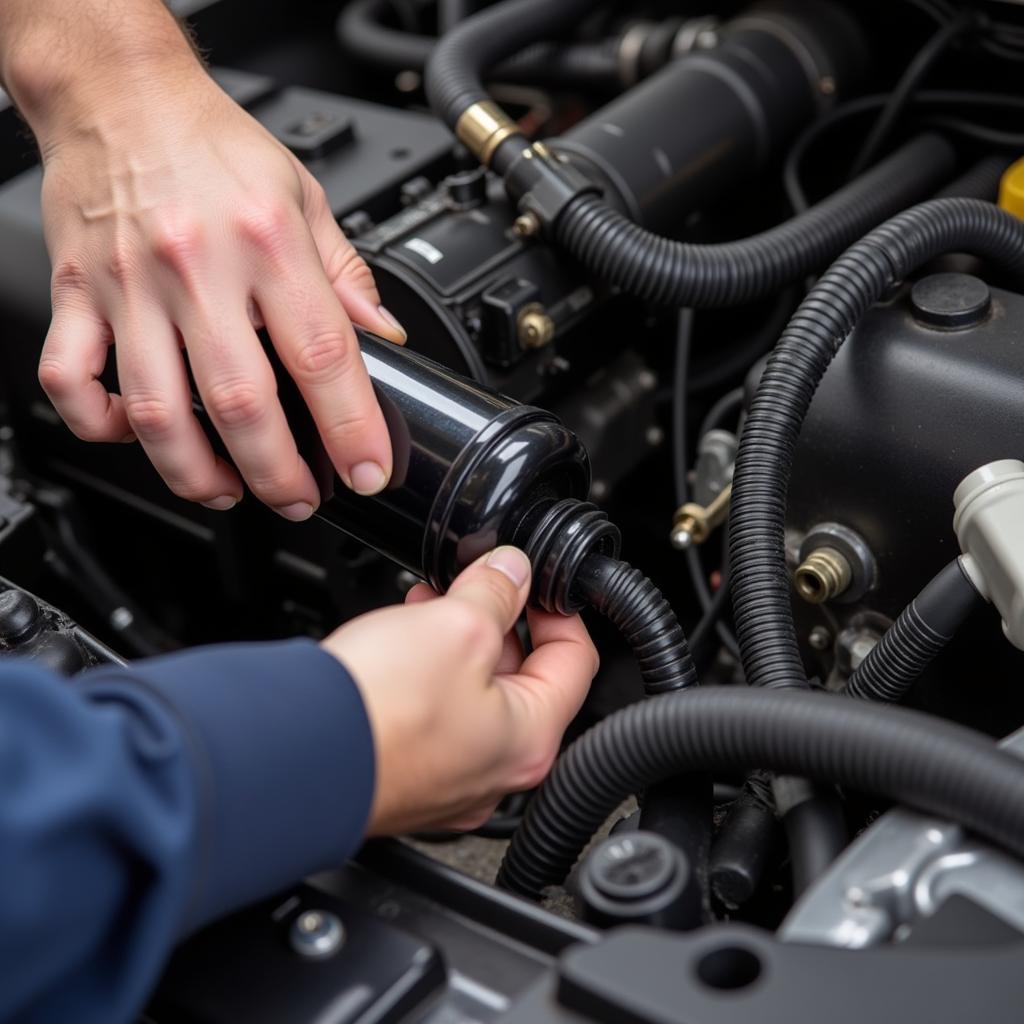 Car Engine Fuel System Inspection
Car Engine Fuel System Inspection
Ignition System Malfunctions
A weak or failing spark plug can prevent the fuel-air mixture from igniting properly, resulting in poor acceleration. Faulty ignition coils can also cause misfires and reduced power. A damaged distributor cap or rotor (in older vehicles) can further disrupt the ignition process.
Exhaust System Restrictions
A clogged catalytic converter or a restricted exhaust system can create back pressure, hindering the engine’s ability to expel exhaust gases efficiently. This back pressure can lead to reduced power and poor acceleration.
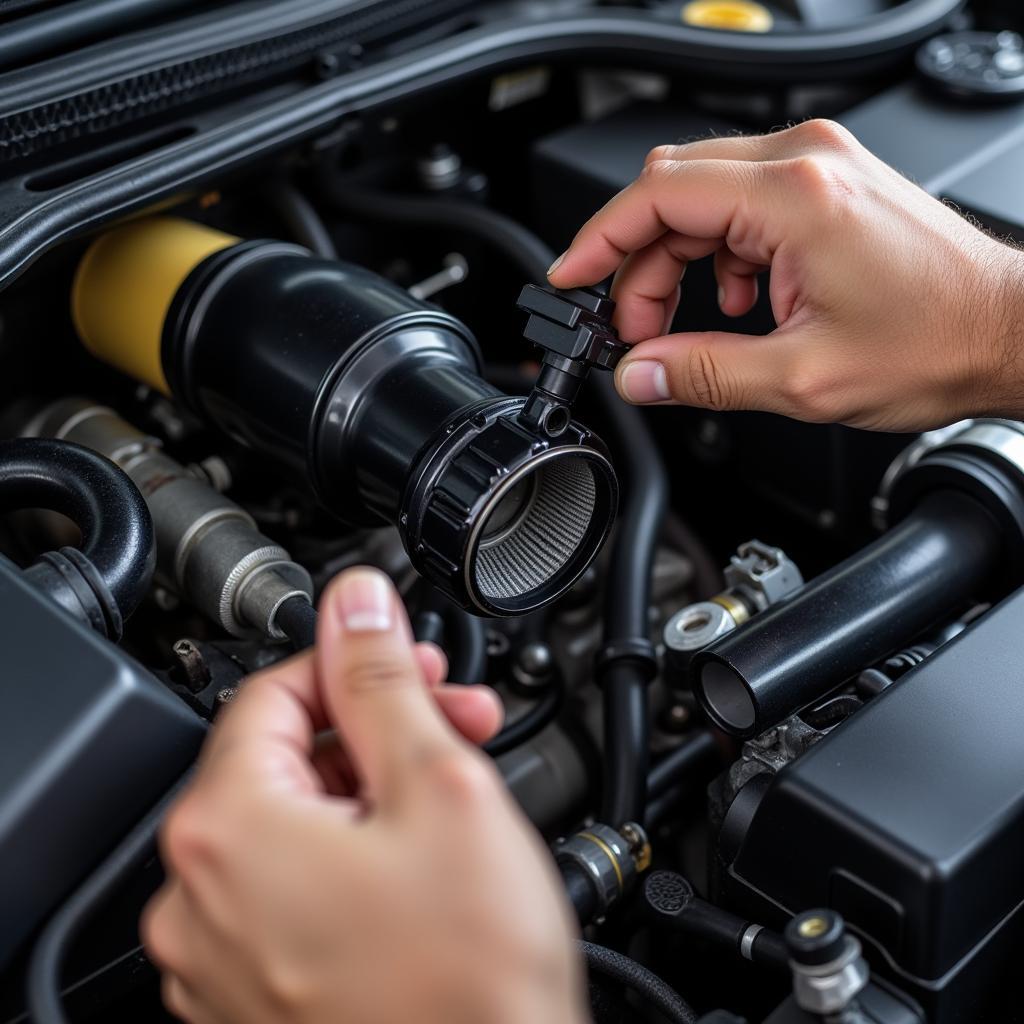 Mechanic Checking Car Air Intake System
Mechanic Checking Car Air Intake System
Diagnosing and Fixing Car Acceleration Problems
Identifying the specific cause of your car’s acceleration problem often requires a systematic approach. Here are some steps you can take:
- Check the easy stuff first: Inspect the air filter and fuel filter. Replace them if they are dirty or clogged.
- Scan for trouble codes: Use an OBD-II scanner to check for diagnostic trouble codes (DTCs) stored in the ECU. These codes can provide valuable clues about the source of the problem.
- Inspect the fuel system: Check the fuel pressure, fuel pump operation, and fuel injectors for proper function.
- Examine the air intake system: Inspect the air filter, MAF sensor, and other related components for damage or blockage.
- Check the transmission fluid: Ensure the transmission fluid is at the correct level and in good condition.
- Test the ignition system: Check the spark plugs, ignition coils, and other ignition components for proper function.
- Inspect the exhaust system: Check for any restrictions in the catalytic converter or exhaust pipes.
Just like heavy rain car acceleration problems can be indicative of specific issues, other environmental factors can also play a role. Remember, safety is paramount. If you are unsure about any of these steps, consult a qualified mechanic.
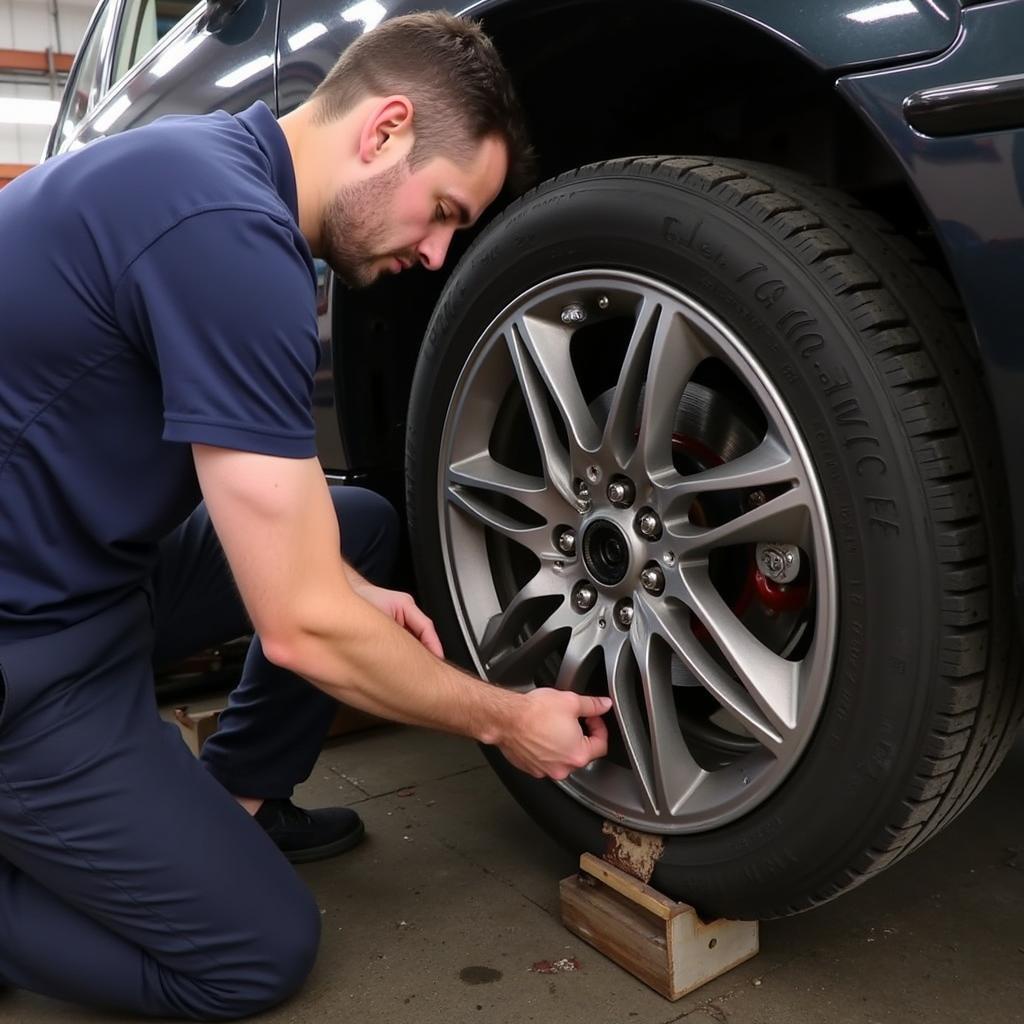 Car Transmission Being Inspected
Car Transmission Being Inspected
Preventing Future Acceleration Problems
Regular maintenance is key to preventing car acceleration issues. Follow your car’s recommended maintenance schedule for fluid changes, filter replacements, and other essential services. This proactive approach can help identify and address potential problems before they become major headaches.
For legal advice regarding acceleration problems, resources like lawyers for acceleration problem in cars can be invaluable. Understanding your legal options is important in cases involving manufacturing defects or other related issues.
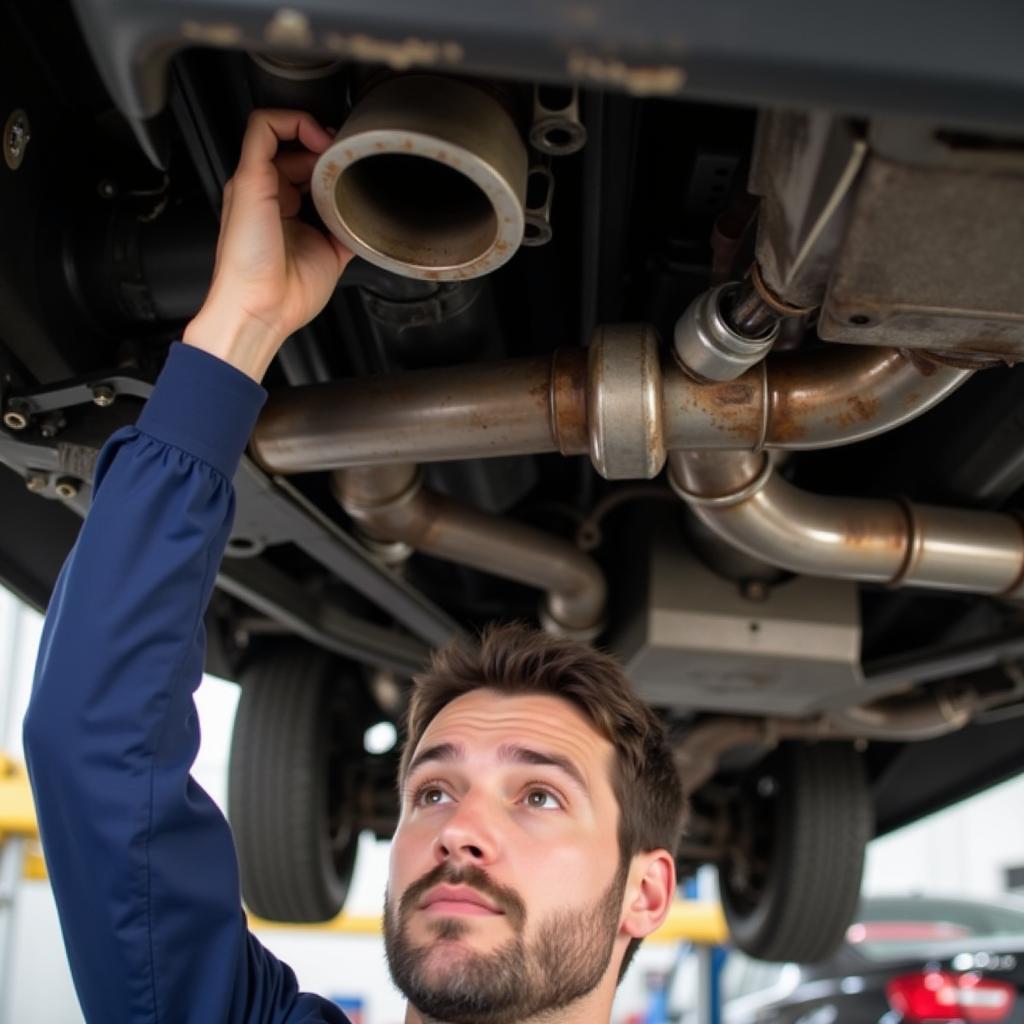 Car Exhaust System Check
Car Exhaust System Check
Conclusion
Problems With Car Acceleration can be a nuisance, but with the right knowledge and approach, you can effectively diagnose and resolve them. Remember, regular maintenance is the best defense against future acceleration problems. By staying proactive and addressing potential issues early on, you can keep your car running smoothly and safely for years to come.
If you need further assistance with car acceleration problems, or any other automotive issues, don’t hesitate to contact us at Autotippro. We offer expert advice and solutions for all your automotive needs.
Contact AutoTipPro:
Phone: +1 (641) 206-8880
Office: 500 N St Mary’s St, San Antonio, TX 78205, United States
If you are interested in more technical aspects like kinematics problem torso head moving car acceleration graph, exploring these topics can deepen your understanding of the physics involved in acceleration. Similarly, car acceleration problems answers provide concise solutions to common questions.




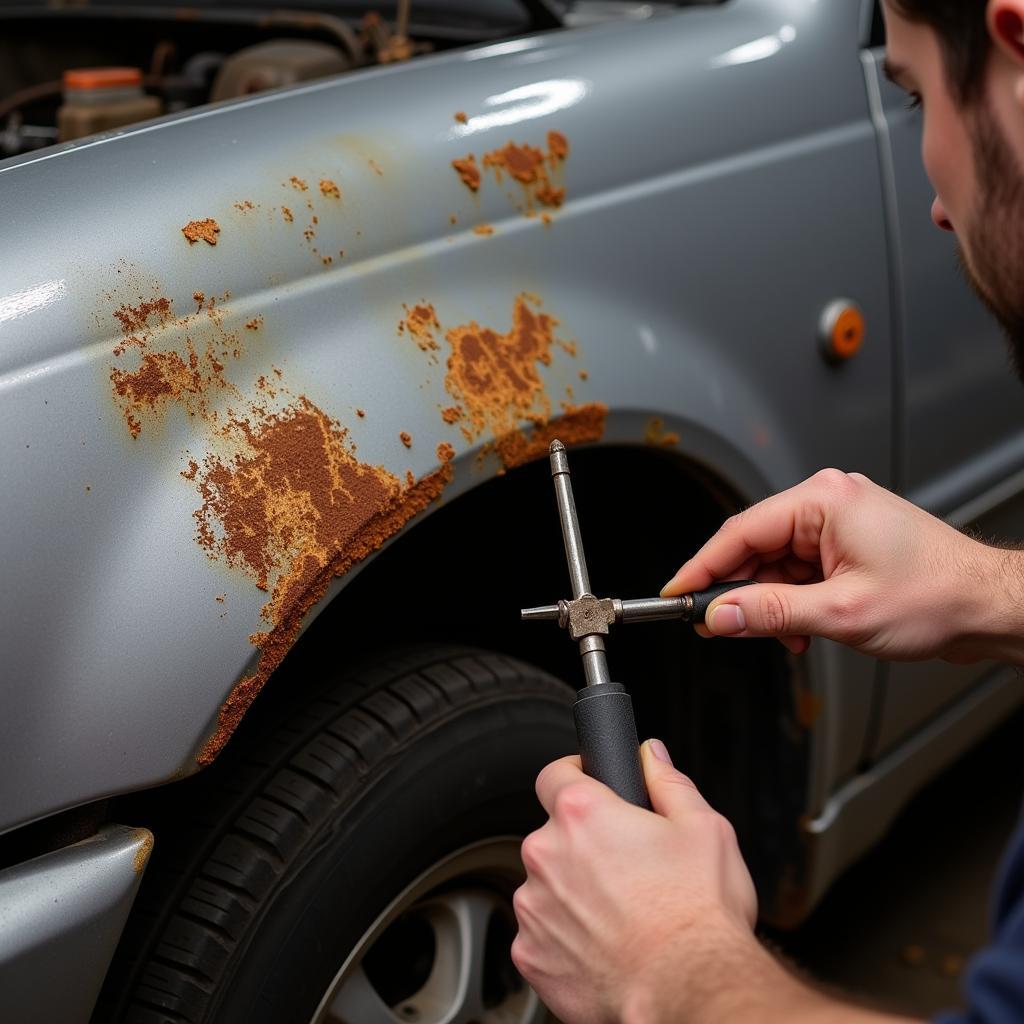
Leave a Reply